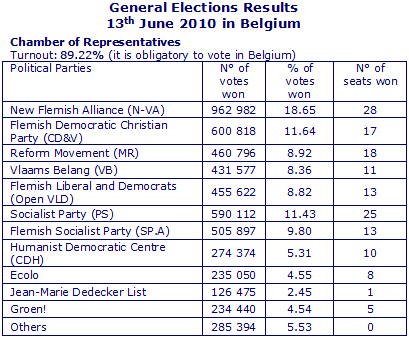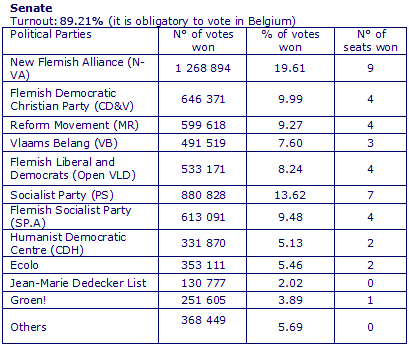News
Fondation Robert Schuman,
Helen Levy
-

Available versions :
EN
Fondation Robert Schuman
Helen Levy
The New Flemish Alliance (N-VA) led by Bart de Wever won the general elections in Belgium on 13th June. The N-VA won 18.65% of the vote and 28 seats in the Chamber of Representatives; it won 20.64% of the vote and 9 seats in the Senate. This is an unprecedented result. The best score achieved today by a separatist party was that won by the Volksunie (VU) in 1971 with 11.1% of the vote.
The N-VA's excellent result is to the detriment of the Flemish Democratic Christian Party (CD&V) led by outgoing Prime Minister Yves Leterme who won 11.64% of the vote (17 MPs) and 10.53% of the vote (9 Senators), and the Flemish Liberals and Democrats (Open VLD) led by Alexander de Croo, which won 8.82% of the vote (13 MPs) and 8.18% of the vote (3 Senators). The Flemish Socialist Party (SP.A) led by Caroline Gennez won 9.80% of the votes (13 MPs) and 9.88% (4 Senators) whilst the ecologists of Groen won 4.54% of the vote (5 MPs) and 3.87% (1 Senator); the far right Vlaams Belang (VB) 8.36% of the vote (11 MPs) and 8.08% of the vote (3 Senators). Finally Jean-Marie Dedecker List won 2.45% of the vote and 1 MP (2.10% of the vote and no seats in the Senate). If the votes of the N-VA, Vlaams Belang and the DeDecker List are added together the parties promoting the independence of Flanders represent 44.1% of the Flemish electorate.
Elio di Rupo's Socialist Party (PS) is the winner of the general elections in Wallonia where it won 11.43 % of the vote and 25 seats in the Chamber of Representatives and 12.24% of the vote and 7 seats in the Senate. It has become the leading French-speaking force. The Reform Movement (MR) led by Didier Reynders declined with 8.92% of the vote (18 MPs) and 8.81% of the vote (5 Senators), Humanist Democratic Centre (CDH) led by Joëlle Milquet won 5.31% of the vote (11 MPs) and 4.95% of the vote (2 Senators) ahead of the Greens of Ecolo who won 4.55% of the vote (8 MPs) and 5.28% of the vote (2 Senators).
Turnout in Belgium, where it is obligatory to vote, was however not very high. It totalled 89.22% for the Chamber of Representative's election and 89.22% for the Senate.
"These are extraordinary results. The Flemish have voted for change, we shall not disappoint them. The State must be reformed," declared N-VA leader, Bart de Wever on the announcement of the results. He called for a reform of the institutions to give greater autonomy to Flanders in both social and economic areas – simultaneously he tried to reassure those who find his programme worrying. "It is not the end of the country, it is a development, Belgium will split into two full democracies. We have to adapt to a reality that already exists," he said saying that Flander's independence was not his immediate claim.
Socialist leader Elio di Rupo acknowledged that the Flemish electorate had sent out a "strong message" in support of greater regional autonomy. "A great majority of the Flemish population clearly wants our country to develop on an institutional level. Attention has to be paid to this message. The Socialist Party has always been ready for a reform of the State," he stressed calling on French-speakers to "make a step towards the representatives of the north and to have the courage to come to an agreement," concluding he said "It is up to the Flemish parties to decide which men and women they want to put at the negotiation table. We shall soon see if there is any desire to reach a compromise. If it is not the case the situation will then be a different one."
"It is a political tidal wave," declared Steve Stevaert, member of the Flemish Socialist Party. The triumph of the Flemish nationalists creates "a situation that will be a problem for the country," believes MR chair, Didier Reynders.
Viewing the results of the parliamentary elections two personalities stand out and should play key-roles in the near future: the leaders of N-VA, victorious in Flanders and the French-speaking Socialist Party. The result should lead Bart de Wever to take on federal responsibilities and stand for the position of Prime Minister but he has said on several occasions that he was not interested in this function. He also said that he was prepared to leave the place to Elio di Rupo. Paradoxically the latter may therefore become the first Walloon head of Government since Edmond Leburton (1973-1974). "It is a sign of acknowledgement sent out to the French speakers who have not had a Prime Minister since 1974. It is also a way of showing that he (Bart de Wever) only has eyes for Flanders," analyses Marc Uyttendaele, professor at the Free University of Brussels; "In any case it is clear that the climate is not right to achieve the split in the country he would like. In fact he is terrified by the idea of having to assume his position. He is a tribune, an agitator. He is the antithesis of the political leader. He is not a Statesman. It is very difficult to pass from the political music-hall to the austerity of ministerial office ..."
Aged 39 Bart de Wever is an historian. He was elected MP to the Flemish Parliament in 2004 (re-elected in 2007) and became a federal MP on 10th June 2007. The most popular politician in Flanders he is promoting confederalism which he sees as a step towards the full independence of Flanders: "we want to go step by step, not with a revolution, we do not want a grand separation evening. My goal is for Belgium to disappear without anyone noticing it, that it evaporates. With Flanders and Wallonia we already have two states that function each with its own Parliament and government. In Brussels the Prime Minister only now chairs over a diplomatic conference. The process must be allowed to move towards its completion."
Born in 1951 Elio di Rupo has a doctorate in science. Elected as a town councillor in 1982 he then became a MP in 1987 and then Senator in 1991. The following year he was appointed Education Minister for the French Community then he took over audiovisual issues. In 1994, Elio Di Rupo became Deputy Prime Minister of the federal government and Communication and Public Businesses Minister. He then was responsible for the Economy, Telecommunications and Foreign Trade. In 1999, he became Minister-President of Wallonia a position he left rapidly after being elected head of the PS. Burgermeister of Mons he became Minister President of Wallonia in 2005, a post he gave up again in June 2007 in order to remain at the head of the PS.
Far from solving the crisis the election result may create an even greater divide within the Belgian political classes and worsen the confidence crisis between the Dutch and the French speakers. The first task for the future government will be to settle the issue of the electoral district of Brussels-Hal-Vilvorde which sits across the province of Flemish Brabant (Hal-Vilvorde) and the region of Brussels-Capital which the Dutch speakers would like to split in two: Brussels and Hal-Vilvorde. Moreover the country is now divided politically between Flanders that is firmly set on the right and Wallonia where the socialists predominate. Finally if Belgium, which will take over the Presidency of the Council of the European from Spain on 1st July, takes on its job without any major problem, the instability and deep crisis it has been experiencing for the last several years may damage the country's image.
 Source: Internet Site Federal Portal of Belgium http://elections2010.belgium.be/fr/cha/results/results_tab_CKR00000.html
Source: Internet Site Federal Portal of Belgium http://elections2010.belgium.be/fr/cha/results/results_tab_CKR00000.html
 Source: Internet Site Federal Portal of Belgium
Source: Internet Site Federal Portal of BelgiumOn the same theme
To go further
Elections in Europe
Corinne Deloy
—
15 April 2025
Elections in Europe
Corinne Deloy
—
25 February 2025
Elections in Europe
Corinne Deloy
—
18 February 2025
Elections in Europe
Corinne Deloy
—
28 January 2025

The Letter
Schuman
European news of the week
Unique in its genre, with its 200,000 subscribers and its editions in 6 languages (French, English, German, Spanish, Polish and Ukrainian), it has brought to you, for 15 years, a summary of European news, more needed now than ever
Versions :



